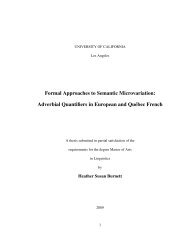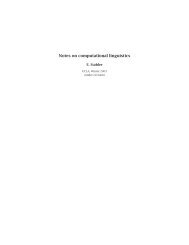Syllabus - UCLA Department of Linguistics
Syllabus - UCLA Department of Linguistics
Syllabus - UCLA Department of Linguistics
You also want an ePaper? Increase the reach of your titles
YUMPU automatically turns print PDFs into web optimized ePapers that Google loves.
<strong>Linguistics</strong> 251A/B: Topics in Phonetics and Phonology Winter 2011<br />
Lexical access and the phonology <strong>of</strong> morphologically complex words<br />
Description<br />
SYLLABUS<br />
Time MW 12:00-1:50 PM Pr<strong>of</strong>essor Kie Zuraw [ka z]<br />
Place Rolfe 3123 Office Campbell 3122A<br />
Phone 310-825-0634<br />
Office hours Mondays, 2:00-3:50 PM<br />
E-mail kie@ucla.edu<br />
Web page www.linguistics.ucla.edu/people/zuraw , under ‘Teaching’<br />
Readings on www.ccle.ucla.edu<br />
Research on the phonology <strong>of</strong> morphologically complex words <strong>of</strong>ten appeals, implicitly or explicitly, to lexical<br />
storage and access. A simple example is the diachronic change <strong>of</strong> a compound into a simple lexeme, as in<br />
English 'cupboard', whose phonology is incompatible with a compound <strong>of</strong> 'cup' and 'board'. A more extensive<br />
case is Hay's (2003) hypothesis that whole words and their sub-parts race for lexical access, with resting<br />
activation determining the winner. (For example, Hay finds more t-deletion in words like 'swiftly', which is<br />
more frequent than 'swift', than in words like 'daftly', which is less frequent than 'daft'; she interprets the<br />
difference as a difference in lexical access whereby 'swiftly' is accessed as a single unit and 'daftly' as a<br />
combination <strong>of</strong> 'daft' and 'ly'.)<br />
This proseminar will review the psycholinguistic literature on lexical access <strong>of</strong> morphologically<br />
complex words. For example, under what circumstances does a complex word prime its base or vice-versa? Do<br />
instances <strong>of</strong> the same affix prime each other?<br />
Goals<br />
One goal is to get a sense <strong>of</strong> what is an a priori plausible claim about lexical access in a particular case,<br />
given the findings that already exist for similar cases.<br />
Another goal is to gain familiarity with the methods in use, and their pros and cons, so that we'll know how<br />
feasible it is to undertake our own psycholinguistic investigations where necessary.<br />
And a third goal is to gain an overall picture <strong>of</strong> models <strong>of</strong> lexical access, in both comprehension and<br />
production, to see where in those models there might be communication with a phonological grammar.<br />
Requirements<br />
Students taking the course for 2 units will present papers (how many papers per student depends on the size<br />
<strong>of</strong> the class).<br />
Students taking the course for 4 units will present papers and complete and individual or small-group final<br />
project; possibilities include but are not limited to conducting a literature review with an eye to explaining a<br />
particular phonological case, implementing a model from the literature to apply it to a case, designing an<br />
experiment, and using existing experimental findings to explain a set <strong>of</strong> phonological data.<br />
Format<br />
For the first two weeks, I’ll lecture (and <strong>of</strong> course we’ll discuss).<br />
After that, each class session will consist <strong>of</strong> a series <strong>of</strong> brief (15-minute?) presentations by students <strong>of</strong><br />
articles; you don’t need to read the ones you’re not presenting.<br />
At the end <strong>of</strong> each week/topic, I’ll take the last 15-minute slot (or two?) for some discussion <strong>of</strong> how the<br />
readings relate to each other and to the theoretical literature.<br />
In the last week or so, depending on interest, students will present something they’re working on or thinking<br />
about and how it relates to the course material.
<strong>Linguistics</strong> 200A, Fall 2009, Zuraw p. 2<br />
Web stuff<br />
Public course webpage (at www.linguistics.ucla.edu/people/zuraw , under ‘Teaching’)<br />
syllabus, handouts, your presentation handouts if you want, eventually an annotated bibliography<br />
CCLE page (www.ccle.ucla.edu):<br />
reading list, in progress; we’ll do the sign-up for who presents what on paper in class<br />
readings for download<br />
annotated bibliography in progress; to be transferred to public page at the end<br />
Course outline (subject to adjustment)<br />
Week Date Topic<br />
1<br />
Jan. 3<br />
Jan. 5<br />
Intro and overview<br />
Background: models <strong>of</strong> word production<br />
Jan. 10 Background: models <strong>of</strong> word recognition<br />
2 Jan. 12 Word recognition, cont’d<br />
Overview <strong>of</strong> methods in use<br />
3<br />
Jan. 17<br />
Jan. 19<br />
Martin Luther King holiday--no class<br />
Experimental studies <strong>of</strong> derivational morphology<br />
4<br />
Jan. 24<br />
Jan. 26<br />
Experimental studies <strong>of</strong> derivational morphology<br />
Experimental studies <strong>of</strong> derivational morphology<br />
5<br />
Jan. 31<br />
Feb. 2<br />
Experimental studies <strong>of</strong> inflectional morphology<br />
Experimental studies <strong>of</strong> inflectional morphology<br />
6<br />
Feb. 7<br />
Feb. 9<br />
Family-size effects<br />
Experimental studies <strong>of</strong> compounds<br />
7<br />
Feb. 14<br />
Feb. 16<br />
Effects <strong>of</strong> phonological alternations<br />
Effects <strong>of</strong> phonological alternations<br />
8<br />
Feb. 21<br />
Feb. 23<br />
Presidents Day holiday--no class<br />
Prefixation vs. suffixation, and other right-to-left issues<br />
9<br />
Feb. 28<br />
Mar. 2<br />
Back to theoretical proposals--what do we think <strong>of</strong> them now?<br />
Back to theoretical proposals--what do we think <strong>of</strong> them now?<br />
Mar. 7 Participants’ presentations<br />
10 Mar. 9 Participants’ presentations<br />
2


















